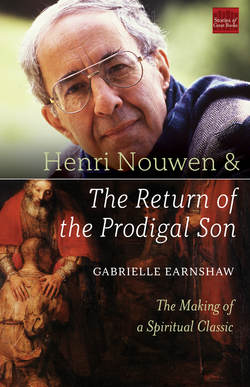Читать книгу Henri Nouwen and The Return of the Prodigal Son - Gabrielle Earnshaw - Страница 14
На сайте Литреса книга снята с продажи.
Search for God
ОглавлениеWhen Nouwen saw the poster he collapsed. At first, the reason for his strong reaction was pure exhaustion and a deep longing for his father’s love. But gradually he began to see that the painting was actually a “large gate” for him to meet the One he had been searching for since he was born—“the God of mercy and compassion.”22 He found that the longer he looked at the painting, the more he saw that the image of God created by Rembrandt was not simply a friendly Father, but the womb of the divine Creator. He was returning to the womb, the seedbed of his true self. For these moments at least, his search for God was sated.23
Yet, his search wasn’t over. When Nouwen’s journey with the Rembrandt painting ended, another one began. In 1991, just as The Return of the Prodigal Son was entering the production stage with his publisher Doubleday, Nouwen became transfixed by another image of God. This time, it was a trapeze troupe called the Flying Rodleighs. In this group of creative people, Nouwen saw God as the catcher and us as the flyers who can take risks because of our trust that we will be caught. The full meaning of this image would take years for Nouwen to understand, but one facet of the attraction was its physicality. The trapeze-troupe image called Nouwen to consider his body and the physical aspect of the spiritual journey. It appears that the next leg of Nouwen’s journey was to be a physical one. He was being called to enter into his body more fully. This is an important turn in Nouwen’s life and one we will return to later in greater depth.
Henri Nouwen collapsed in front of the prodigal son poster in 1983. A number of factors, including his nature as a spiritual quester, led to that moment. When The Return of the Prodigal Son ends, we have witnessed a metamorphosis. A central event on the way was forgiving his father. He shifts his focus from the father he doesn’t have to the father he does; and he finds freedom. He courageously lets go of the privilege of sonship and claims the gift of spiritual fatherhood. Nouwen senses the freedom of being a child of God without the prison of resentment or self-occupation. Blessing others becomes important.
As readers, we recognize this story because it shares elements of a hero’s journey. Nouwen goes through trials and emerges on the other side a changed man. He lives his struggles differently in light of his newfound wisdom.
John O’Donohue, in his book Anam Cara, suggests that there is a place inside every one of us that has experienced God’s unconditional love and that we spend our lives trying to get back to it. He writes, “We are capable of such love and belonging because the soul holds the echo of a primal intimacy.”24 Nouwen, through his personal story, tells this universal truth of life.
